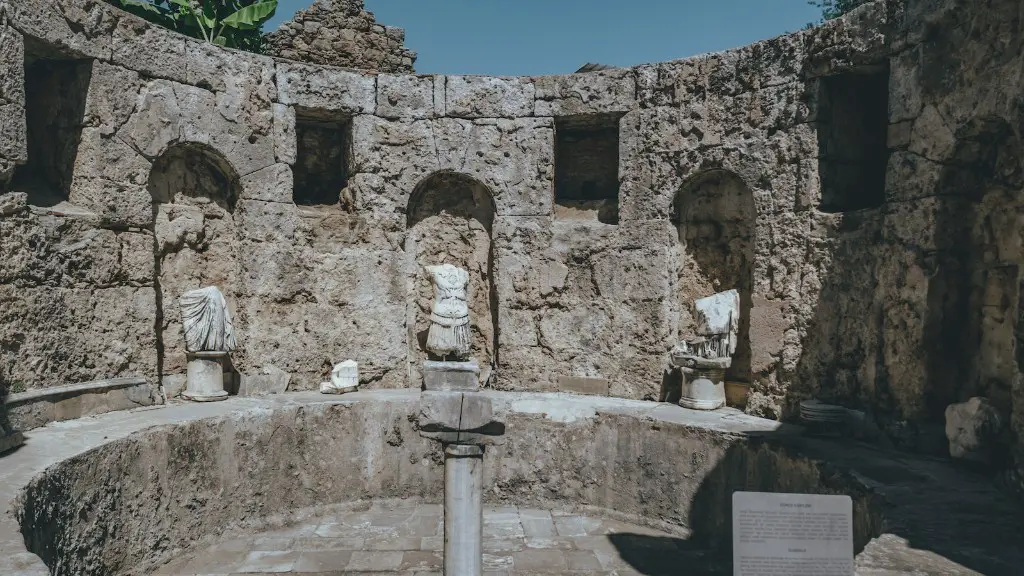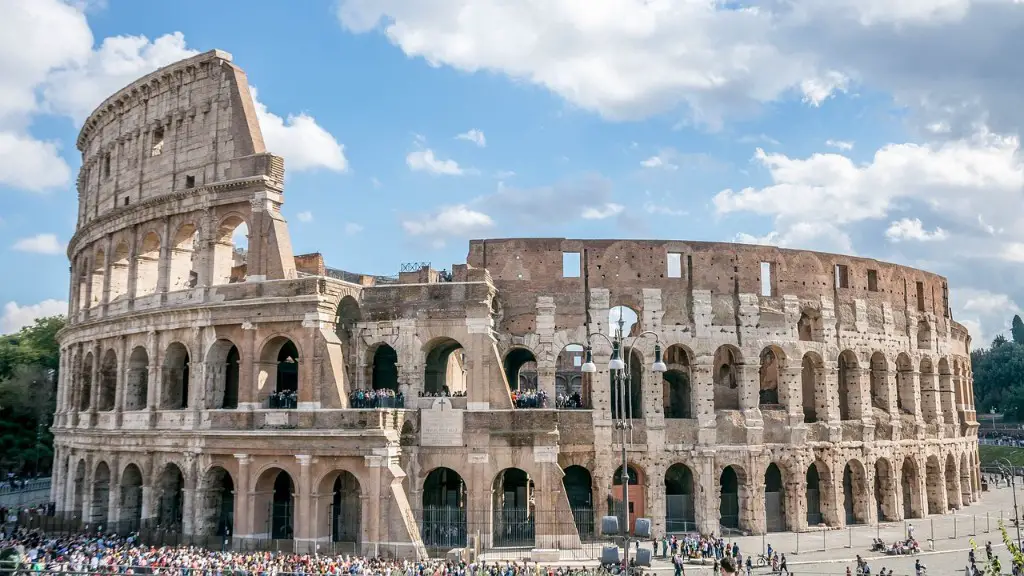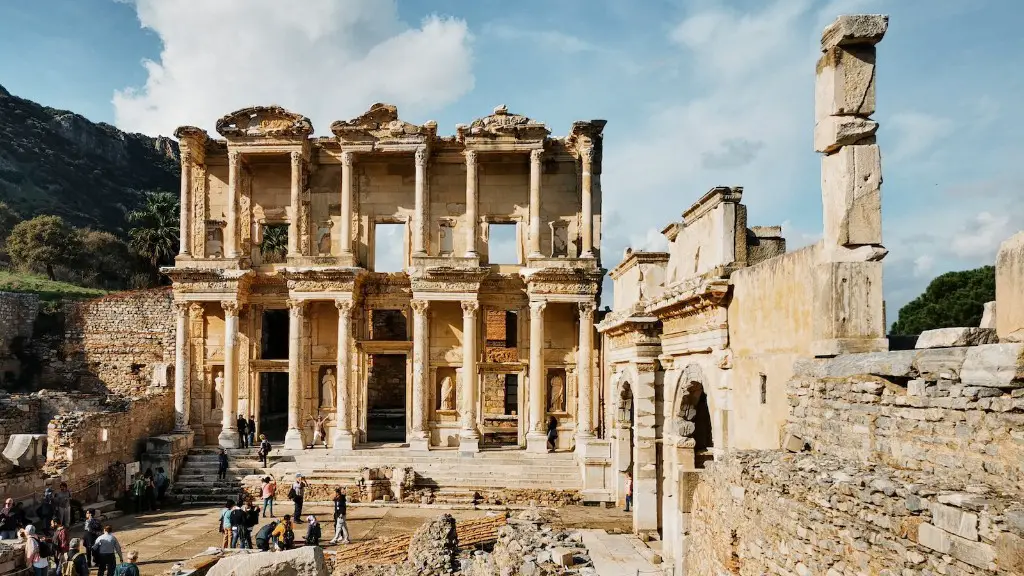Barbarians in Roman History
The term ‘barbarian’, in ancient Rome, was used to describe foreigners and non-Roman populations that lived outside the Roman Empire. It was a derogatory term used to describe other cultures, particularly those that didn’t adhere to Roman ways of life. Over the course of its history, the Roman Empire encountered several different groups of people whom they termed ‘barbarians’ – including Gauls, Germanic tribes, Celts and Huns.
At first, the Romans avoided contact with these ‘barbarians’, seeing them as a potential threat to their security and lifestyle. However, as the Empire expanded, it became clear that it was not possible to avoid these groups. Over time, the Romans realised that it was necessary to make some kind of accommodation with them.
As a result, the Romans developed a policy of ‘barbarian accommodation’. This policy involved cultural and political integration between Roman and non-Roman peoples. Roman law was introduced to the Barbarians and Romanised cultural practices were gradually adopted. This enabled the Roman Empire to peacefully incorporate new populations into its boundaries.
While Roman culture was obviously the dominant influence, it is important to remember that Barbarians played a major role in the development of the Roman Empire. Roman military tactics incorporated the best of Barbarian fighting styles, while Barbarian art and culture contributed to Roman art and culture. In fact, many Barbarian tribes eventually became Roman citizens and assumed important roles in the Empire.
The Barbarians and the Roman Empire had a complex and often hostile relationship. On the one hand, the Romans were often hostile towards their ‘barbaric’ neighbours, while on the other, the Barbarians often ate and traded with the more civilised Romans. Over time, however, the two groups formed an uneasy alliance and even, on some occasions, formed alliances with one another.
The Barbarian tribes of ancient Rome played an important role in the history of the Roman Empire. They provided valuable military assistance to the Romans and played a major role in the development of Roman culture and law. Although initially seen as a threat, their influence eventually became essential to the survival of the Roman Empire.
Barbarian Participation in Roman Culture
One major way in which Barbarians interacted with Roman culture was through participation in festivals, celebrations and games. Barbarian festivals, such as the Lupercalia, were enthusiastically embraced by the Romans who often advertised the event in Latin and decorated their houses with Barbarian symbols.
The Barbarians also played an important role in Roman sport. The most famous Barbarian game was the ludi, which involved team sporting events such as ballgames and wrestling matches. The Barbarians also took part in the famous chariot races which were held in the Circus Maximus.
The Romans also incorporated some of the Barbarian religions into their own. For example, the cult of Mithras, which was popular among the Barbarian populations of the Roman Empire, was adopted by the Romans and incorporated into their religious practices.
Barbarian art also found its way into Roman culture. Gothic style architecture, which had been popular among Barbarians, was adopted by the Romans. The Barbarians also influenced Roman sculpture, which often combined aspects of Barbarian and Roman styles.
In essence, Barbarians and Romans blended art, religion and culture, albeit in unequal proportions. Barbarians were often underrepresented and represented in a negative light in Roman literature and art, but their influence on Roman culture was still very important.
Barbarian Trade and Commerce
Despite the Romans’ hostile attitude towards Barbarians, trade and commerce between the two groups occurred. Barbarian traders travelled far and wide to Rome, bringing goods and services which the Empire was in need of. This included leather and fabrics, weapons, food and other goods.
Barbarian traders ingratiated themselves with the Roman elites and were often welcomed by wealthy circles. Some even became arbiters of trade and commerce, helping to mediate disputes. Barbarian traders played a vital role in the Roman economy, helping to secure the Empire’s wealth and prosperity.
The Barbarians also had a significant impact on Roman geography. Barbarian peoples migrated and moved across large areas, resulting in the founding of new cities and markets. This helped to create vibrant trade routes, connecting the Empire to other regions.
The Roman Empire was largely built upon its ability to assimilate and adopt foreign practices. Its trade networks and political policies helped to bring together diverse populations, creating a melting pot of cultures. Barbarian traders played an invaluable role in this process, helping to create a prosperous and powerful trading centre.
Barbarian Interaction with the Roman Military
The Roman Empire was highly militarised, and the Barbarian tribes were often a source of military strength for the Empire. The Barbarians were often skilled soldiers, capable of rapidly adapting to Roman military tactics. As a result, the Romans increasingly employed Barbarian mercenaries, particularly during times of conflict.
The Barbarians also contributed to the Roman military in other ways. Barbarian artisans were employed to manufacture arms and armour. Barbarian scouts were used to find and obtain the resources the Roman army needed. Barbarian engineers helped to construct roads, bridges and fortifications to allow the army to travel more quickly and efficiently.
The presence of Barbarians in the Roman army was not always welcomed. There were occasions when Barbarian troops refused to follow orders, leading to conflict. In many cases, however, Barbarian troops were highly respected and admired by the Roman officers, and some even rose to positions of great power.
In conclusion, the Barbarians played an important role in Ancient Rome. They helped to shape Roman culture, trade and military strength. This interaction between Barbarians and Romans would ultimately lead to the fall of the Roman Empire.
Barbarian Influence on Roman Language
The barbarian languages of Ancient Rome had a significant influence on the Latin language. The Barbarians spoke a variety of languages including Celtic, Gaelic, Germanic and Slavic. Many of these languages had similar roots, which led to an extensive borrowing of words and ideas.
The Barbarians also introduced new words to the Latin language. Many of these words are still used in modern languages. For example, the Latin word ‘tabula’, meaning ‘table’, was borrowed from the Celtic word ‘tabla’. Similarly, ‘annum’, meaning ‘year’, was borrowed from the Gaelic word ‘anam’. These examples demonstrate the Barbarian influence on Latin and its subsequent impact on modern languages.
The Barbarian influence on Latin also extended beyond words. Barbarian tribes introduced grammar and syntax which had never been seen before in Latin. This added complexity and a greater level of nuance to the language.
Although Latin eventually became the language of the Roman elite, the Barbarian tribes played an important role in its development. Their languages contributed new words and ideas to the Latin language, helping it to evolve and adapt to the changing world.
Barbarian Political Influence
The Barbarian tribes of ancient Rome impacted the political landscape of the Roman Empire in many ways. Barbarian kings often developed close alliances with Roman rulers, allowing them to gain greater political influence. Barbarian kings frequently intermarried with Roman aristocrats, allowing them to acquire more wealth and power.
The Barbarians also influenced Roman law. Following the fall of the Roman Empire, many Barbarian tribes adopted Roman laws and customs. This process, known as the ‘Barbarian Legal Revolution’, resulted in Barbarian laws being implemented across the Roman Empire, replacing regional legal codes and ushering in a new era of legal uniformity.
The Barbarians also played a significant role in the rise and fall of Roman Emperors. Through alliances, both political and military, the Barbarians were able to support the rise of certain rulers and undermine the power of others. The Barbarian influence on Roman politics was often subtle, but had an undeniable impact on the political landscape of the time.
Overall, the Barbarian tribes of ancient Rome had a significant and often overlooked impact on the history of the Empire. Through their participation in Roman culture, trade, military and politics, they helped to shape the Empire and its subsequent legacy.
Barbarian Contributions to the Roman Economy
The Barbarian tribes of Ancient Rome played an important role in the Roman economy. Trade between the Barbarians and the Romans was crucial in supplying necessary goods, building roads and maintaining peace across the Empire.
The Barbarian peoples also contributed to the Roman economy in other ways. Barbarian artisans were often employed to create works of art, jewellery and other goods. Barbarian soldiers helped to protect Roman trade routes and taxation systems were adopted from Barbarian models. The Barbarians also provided fodder for the Roman army and helped to build roads, bridges and other structures.
The Barbarian impact on the Roman economy extended beyond practical measures. Barbarian culture also helped to shape Roman ideas about wealth and luxury. Barbarian art and culture influenced Roman ideas about beauty and style, resulting in changes to Roman architecture and art. These changes had a lasting impact on the Roman economy.
In conclusion, the Barbarians of ancient Rome played an essential role in the development and maintenance of the Roman Empire. Their influence on Roman culture and economy was profound, and their contributions were essential to the success of the Empire.





